Welcome to a very special episode of “Arrivals and Departures.”
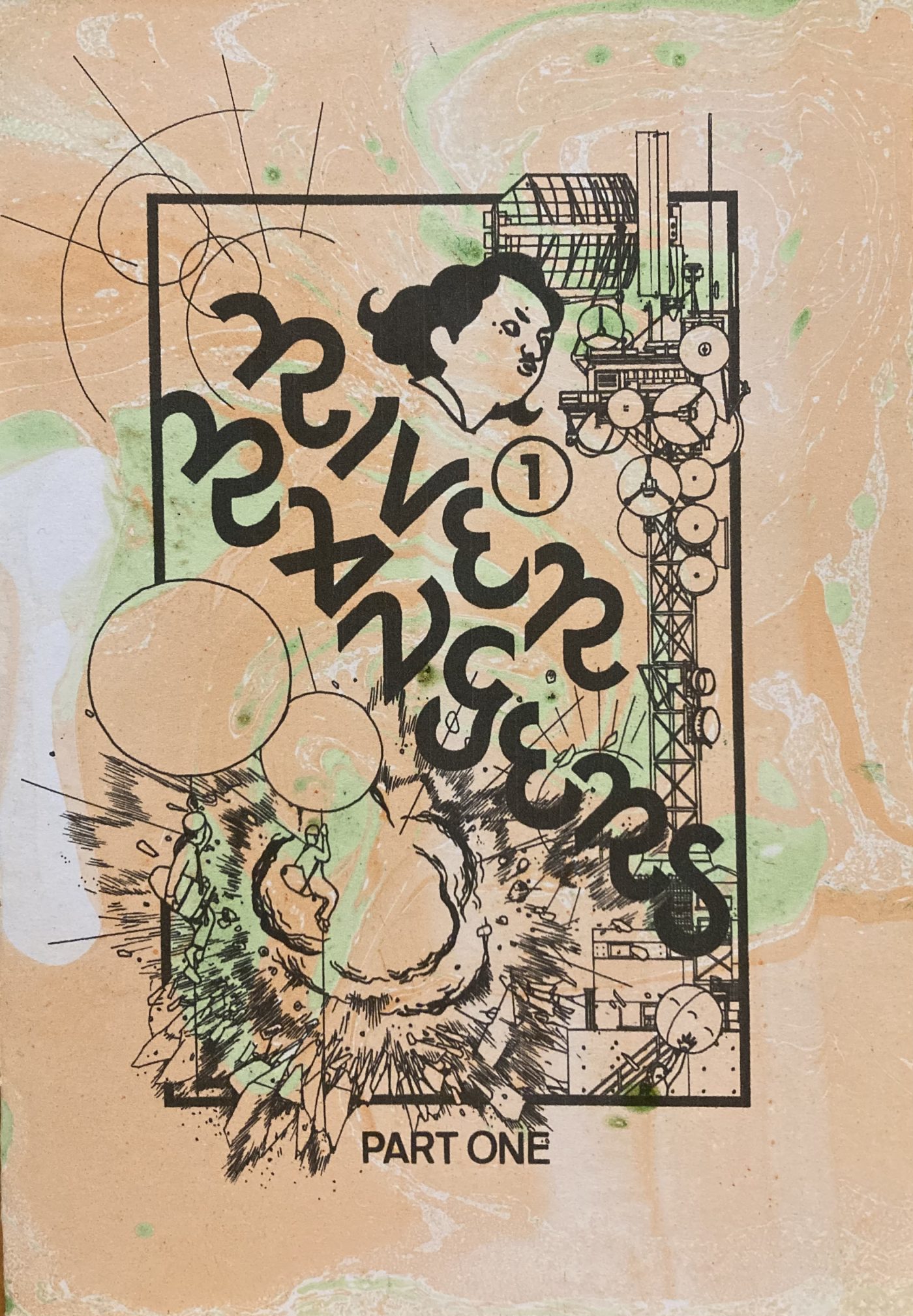
River Rangers #1 by Henry McCausland
For about five years I took on the renowned role of “Submissions Editor” at Fantagraphics. That essentially means the dozen or so hardcopy packets and pamphlets we received in the mail every weekday got plopped on my desk. And I looked through them. All of them. Many were simply pitches for ideas people had typed out on a cover letter. A good portion were six or seven completed panels and then a description of what will come in the next riveting 400 pages. In my time there, two different men knocked on the office door and asked me to tell them what we thought of their work to their faces. Another man came and asked for the paper back so he could submit it somewhere else after he didn’t get a response. Once I opened a box full of many mechanical pieces for a clock I learned the mailer claimed was an homage to Chris Ware. I’ve got to tell you the only thing better than a coffee to jolt you awake in the morning is unwrapping suspicious time-keeping parts, Chris Ware-inspired or not. But a few of these submissions — and I mean a few — were goodies! In that time, I probably wrote back to a total of 10 cartoonists. I passed projects on to the publishers even less than that. There was only one submission that ever caused me to immediately jog it down the hall to Eric Reynolds’s desk, to vibrate with excitement, to make me feel like I was part of something bigger. That piece of postage contained what would become one of the best comics of the 2020s: Eight-Lane Runaways by Henry McCausland.
I am happy to report that McCausland has not fallen victim to the sophomore slump. Far from it, in fact. Even in the premier issue of his new series you can tell he’s (real or imagined by myself) working through and alongside artists like Helge Reumann, Jacques Tati, Jacob Weinstein, Jackie Chan, and CF to make comics that are undisputedly idiosyncratic. It’s been said that the biggest compliment you can pay an author is if their byline was erased and their readers could still confidently identify the hand behind it. McCausland is not only a writer of that caliber but in River Rangers also takes up the mantle of architect, inventor, humorist, and choreographer as cartoonist. Issue one starts at a seaside military base where a radar technician detects “extraordinary flotsam” floating down the river. This is followed by four pages of power struggles, relationship falling-outs, and an open-handed-slap fight. Everyone in the outset of River Rangers is either in a full-blown panic or yearning for a time when they were panicking. The foreign objects turn out to be sticks and they’re dredged out of the current. They all seem to be about nine inches long — some are painted, some are growing various algaes, some are notched into or otherwise modified by human hands. They are vastly important. The technician hijacks a transport vehicle full of sticks and hightails it up a mountain as missiles rain down on her, leading to explosions and casualties. The tone is flummoxing and perfect.
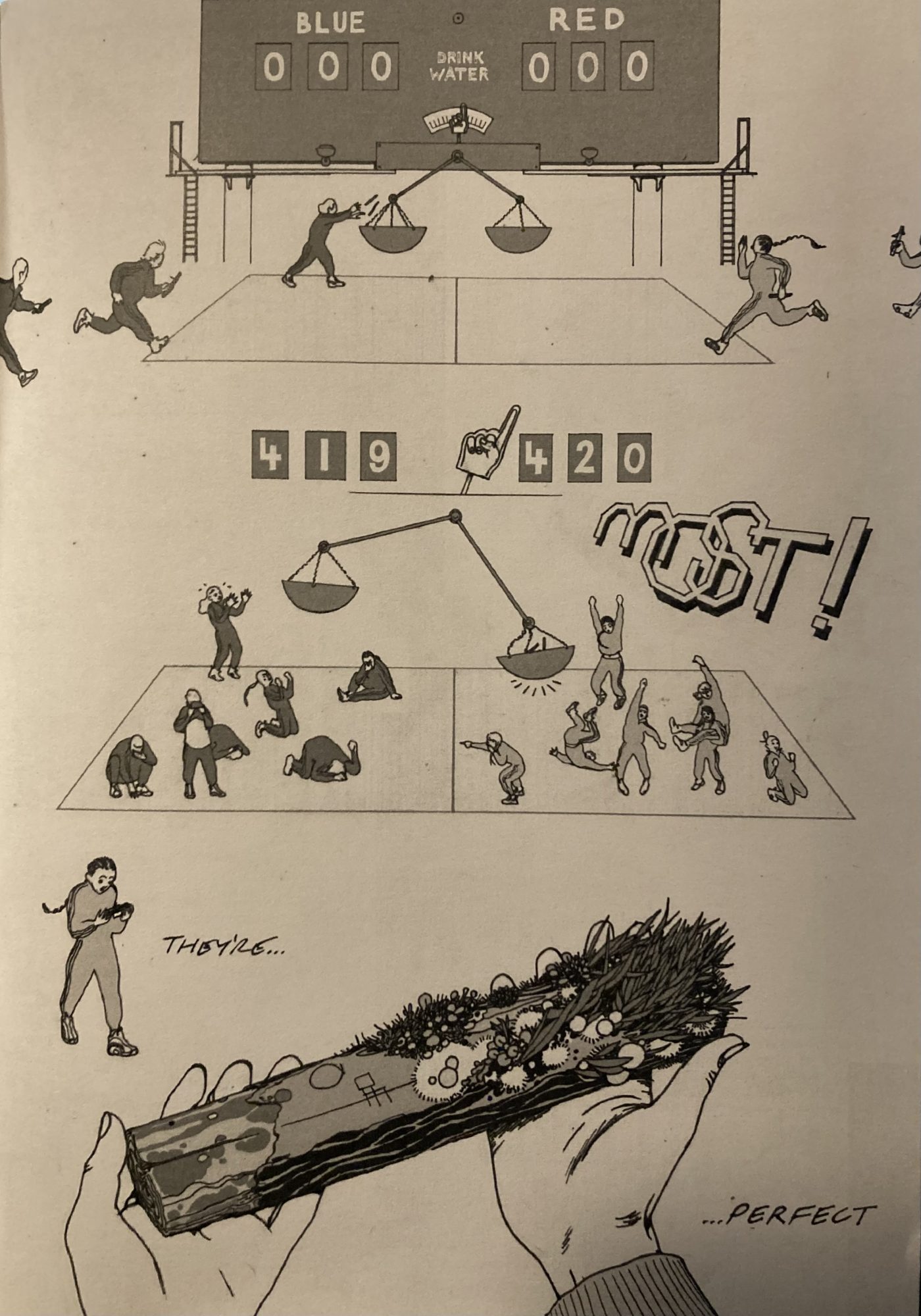
River Rangers #2 by Henry McCausland
The first comic I ever read was Silver Surfer #54. In it, Rhino nihilistically believes the world is coming to a dramatic end so he takes it upon himself to let out all the animals that inhabit the Central Park Zoo for one final taste of freedom. Surfer hits him with a gumball machine that explodes all over the page. They fight in a shark tank. A tiger stalks a cop. The pace, the tenor, and the dead-serious silliness — not unlike what’s found in River Rangers — ultimately created what became a comfort zone for me. Comics themselves were my relief growing up as I whiteknuckled a childhood that habitually lacked it. I would read this issue over and over and over again. The lone penguin, newly emancipated, would nudge against the ankle of a befuddled Silver Surfer as I huddled in a half-finished basement to avoid the occasional violence and the consistently loud threat of it. Early issues of Bone muffled the slammed doors. I would focus on all the strange lines on the cover of the premier issue of Force Works instead of the sniffling and sobbing in other rooms. After clashes with my mom, my first stepdad would get so worked up that he’d puke. It took a lot of X-Men Adventures to block all of that out. Here’s where all the anger and disarray started to sink into the soil. Out of it, I’ve bloomed into a very normal person who writes very normal comic reviews. Rhino, looking out at the destitute zoo he’s singlehandedly decimated, outstretches his arms and states, “I like widespread panic.”
Kids are sprinting. They’re climbing over fences. Due to recess allegiances, they’re already in red and blue teams and the one who collects the most sticks wins. The school is also hastily gathering these mystery branches to play “Pro-Sticks,” a sport that hasn’t been competed in for 4,000 years. To decide which group goes first, they must contend in a gauntlet of other gameplay. McCausland goes ham in this second installment, drawing these sweat-suited youths taking part in athletics both real and imaginary. On some pages you get a birds-eye peek of the geometric field. In another spread, your eye follows a ball as it pogos from the top of the left-hand page, through the sewn middle fold (all of these comics are hand-stitched!) where half-time is being observed and tea is being distributed, all the way through the outstretched hands of the goalie at the bottom of the right-hand page. The contests get more and more impassioned and careless, leading to another fruitless death. Then the teams vie for who can dig a grave faster. McCausland can seamlessly get into the nonsensical mind of team groupthink while also drawing great dark-humor gags. After all of this, Pro-Sticks isn’t of any interest anymore. The twigs are hurled back into the river. Oftentimes alarm is all for hilarious naught.
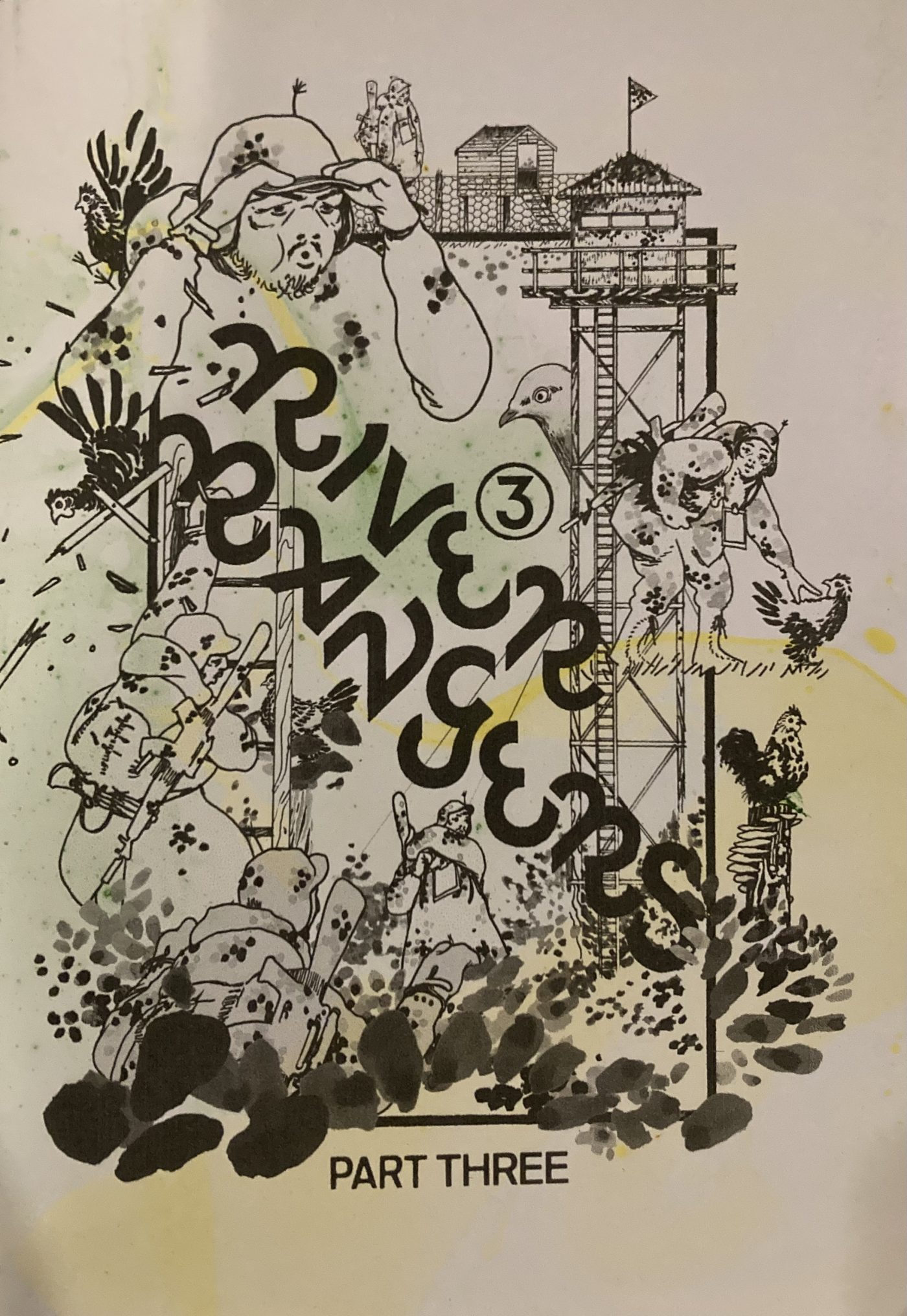
River Rangers #3 by Henry McCausland
My grandfather was an actor, taxi driver, teacher, poet, real estate agent, newspaper editorialist, and principal until he told the school board to go fuck themselves. Then he was fired. He was also a cartoonist. He drew in a very rudimentary John Liney style and kept strip collections behind his recliner in the corner — Far Side and, puzzlingly, Herman by Jim Unger. I’ve never known anyone else who owned a Herman anthology, let alone several of them. In my adolescent memories, I recall him as both hysterical and loving as well as frequently irritated and taciturn. It seemed like there was a significant deal of turmoil in his head, making him forever restless and temperamental. As I grow older it appears I’m taking on many of his qualities, both positive and negative, like it’s some sort of ancestral fate set in stone. I wish he got to meet my sons. I wish he got to read anything I’ve written. There are seven one-panel gags entitled “Cartoons by Casey” that were apparently published in a local Chicagoland bowling magazine. Half of them are fairly unamusing because the well runs dry on bowling jokes rapidly, but one comic forever lives in my head. It’s of a long semi-truck crossing the frame to the left. On it is written “Fertilizer.” Behind the road is a farm with a cow sticking his head over a fence with a thought bubble that reads, “Goodbye, Mr. Chips.” A poop joke and a reference to the 1939 Best Picture nominee! My grandfather appears to be having some difficulty with the sight lines and the vanishing point of the fence and road. There’s some experimentation and struggle with ink thickness while drawing the speeding vehicle. The cow's face is smiling. It is imperfect. It is idyllic.
Back to McCausland’s boutique reality. In a woodland area colored in splotches of grays and inkwashes that resemble finger painting sits a lookout tower above the canopy. Some sort of park ranger is on his daily patrol, which mostly consists of tracking down chickens and returning them to their coop. McCausland has an exceptional aversion to panel borders and in this issue it feels like your eye is taking a trek along a trodden forested path. While on his beat, he notices and collects a bundle of sticks that are floating down the river and takes them back to his pillared base. Here, the ranger and McCausland spreads the arsenal of sticks out in a symmetrical layout on the ground that both resembles a Wes Anderson still shot and a page from The Punisher Armory. While dreaming up a contraption to keep his fugitive fowl from once again escaping he mistakes “shit powder” for sugar and pours it into his tea. Poop jokes are timeless. The chickens exit their enclosure once again and the ranger kicks the sticks in frustration. They return to the water and this wordless chapter comes to a close. This issue is a breather and we could all use one of those.
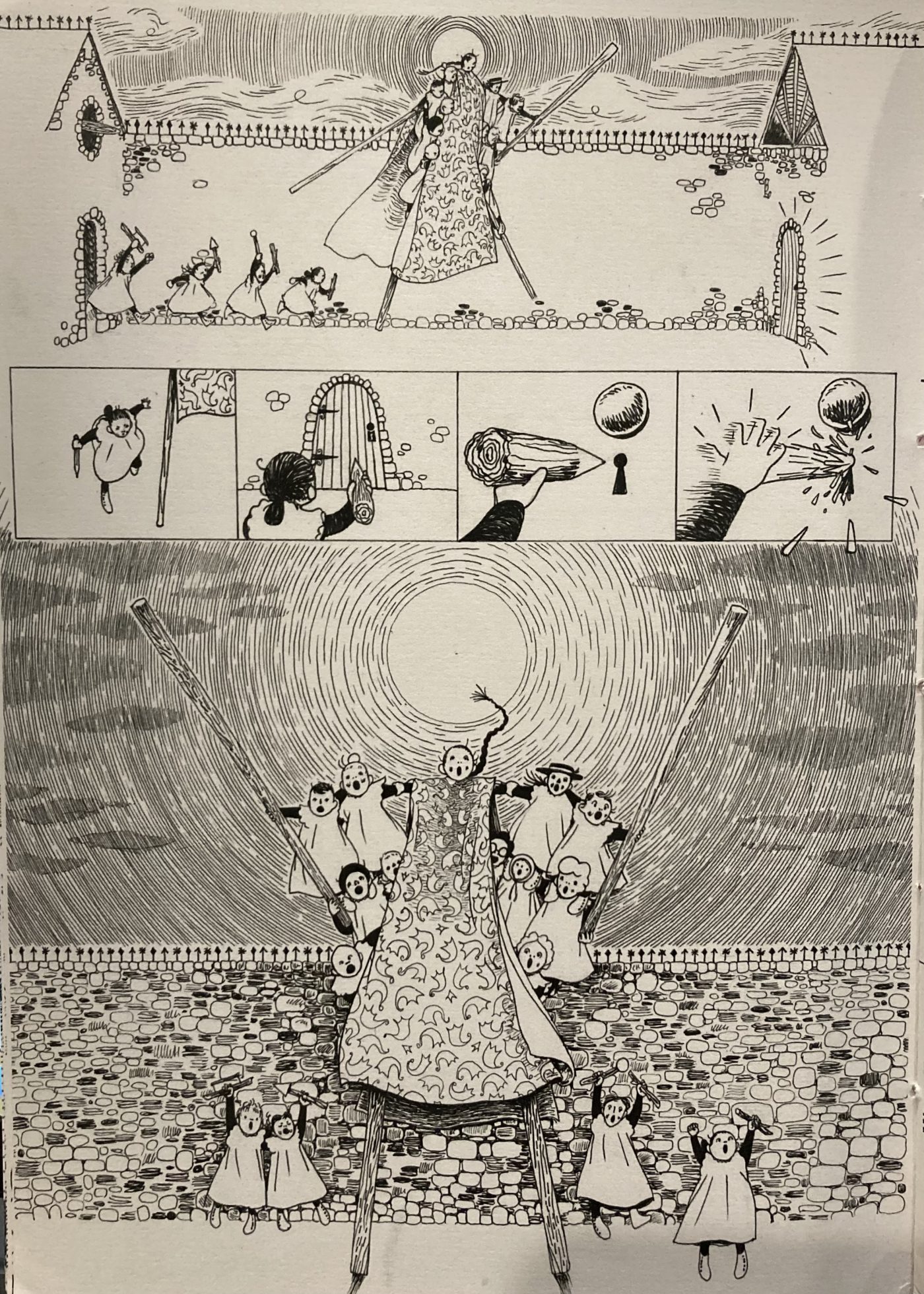
River Rangers #4/5 by Henry McCausland
For a time, comics were everything I breathed. I taught during the day then ran a comics club for nine- and ten-year olds after school. When I got home in the evening and on the weekends, I ran a micropress out of my apartment closet, churning out about 30 titles in five years that ranged from four pages to 200. Some of them were very successful, others not so much, but the co-founder of the company and I drove to around 60 shows during that time, standing (only standing!) behind tables all over the country. I remember hawking our wares next to a "Ron Paul for President" informational table somewhere in Ohio or Michigan. One time we popped all four tires on the drive to TCAF. Another time, in Fort Wayne, Indiana, of all places, I startled Jim Steranko by saying hello to him at the hotel. “The last time a big guy cornered me in an elevator it was because I fucked his wife,” he said. Hours were spent nearly every week at the local comic shop and the owner even officiated my wedding. (Hi, Patrick!) After five years of teaching, I got a call to sign a tenured contract and an opportunity to work at the district office over the summer, revamping some curriculum. I declined and politely told them that I was moving halfway across the country to take an unpaid internship with Gary Groth and Kristy Valenti. At no fault to anyone but myself, comics, once my life force, became my work. Then when I left that job, they became just something I dabbled in. My bedrock was becoming slowly, slovenly unmoored.
Issues #4 and 5 make up a “Bumper Dumper Double Bubble” and here’s where the story really starts cooking. There’s a mill that serves as a power station and water treatment plant and is described as one giant wheel. It’s jammed — sticks, of course — and a crack crew of emergency volunteers must get the wheel unstuck before calamity. Each contributor to the greater good gets a full-page spotlight to flaunt their layer-upon-layer hazmat suits that look like they’re straight out of a costume chest and list their litany of maladies. The debris is pulled out, the focus is shifted bureaucratically to a new protective guard for the wheel, and the stick is sent down a construction chute back into the river. Second part, new setting. Now we’re observing a cobblestone castle-like orphanage. The residents are foul-mouthed, smock-wearing kids full of quips and ingenuity. Without hyperbole, this is the closest thing I’ve read to a Ruth Krauss/Maurice Sendak collaboration like A Very Special House outside the genuine article. Threading the fine line between naughty and nefarious, the children punch a hole in the roof, craft a pair of stilts, and break into the fancy quarters of their absent caretakers. There they find tea and sticks sitting on a posh wooden table. McCausland’s thin line and his discretion with it is able to steal the show; portions of pages are completely filled in with background accouterments while other sections are left white and lets the action in the foreground do the heavy lifting. In a moment of masterful cartooning — one of truly many in this series — the kids form an orphan V0ltron and banish their oppressors.
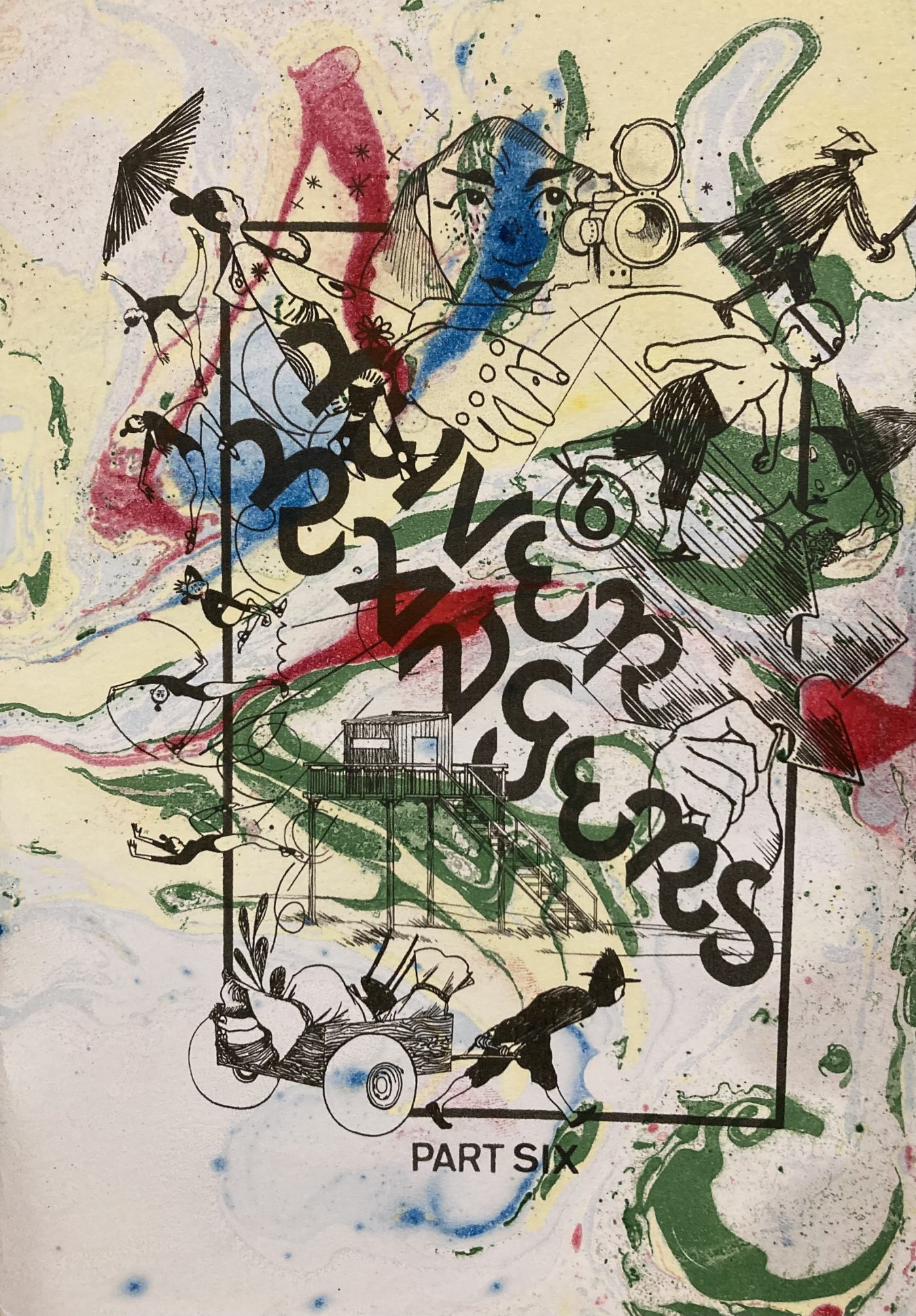
River Rangers #6 by Henry McCausland
My younger son doesn’t seem to have an affinity for comics whatsoever. Lucky him. But my older son can’t get enough of them. He also has a nervous system disorder. This gives him low-level panic attacks throughout the day and puts him in “fight or flight” mentality when faced with questions, decision-making, and social pressures. He always chooses “fight.” As a parent, there’s a lot of tiptoeing backward through eggshells and playing mental chess: “If I do this, I think he’ll react this way. If he reacts that way, I can say this.” Most days include a little bit of struggle and some days include a lot of bit. All of this pushed comics — especially the yearning to collect, for some reason — out of my mind. A few years ago we were all hitting our breaking points, but I luckily found resources that helped me develop tactics on how to help him and myself. One strategy to find grounding we lucked upon was to sit quietly and read countless Paul Murry-drawn Mickey Mouse stories. We spent years looking for calm and my Goofy impression and Murry’s underrated chops let us have brief instances of regulation for a time. The Disney comics strategy still has its moments, but doesn’t consistently work anymore. I have no doubt my son is going to grow up to be a punk rock civil disruptor for fairness and continue to fight the man every chance he gets. But right now, I’m the man. The man with a Phantom Blot tattoo over his heart.
A hand-dyed cover ramps up the already high production value of part 6 and my copy looks like the innards of a glass marble. Where, in previous issues, McCausland has focused more on the institutions — school, power plant, orphanage, military — here he shifts his attention to the individual. Four characters skedaddle across their pages absolutely tickled by the sticks they’ve come across, seeing them not only as blank canvases, but as muse. One scratches dance routines into the wood with a nail file. One scrawls poems with a quill pen. One paints chair-heavy still lifes. And one shirtless astronomer carves the wood into abstract key shapes that trace the constellations. They become so tribal about their hobbies and sacred creative spaces that when one lightly intrudes upon the other, they all flip a havoc switch and become cold-blooded assassins. McCausland himself can toggle between drawing pages that are magical and maniacal. He really is one of the best cartoonists in the world. This time, the chapter ends when bodies are dumped with the sticks whence upon they came.
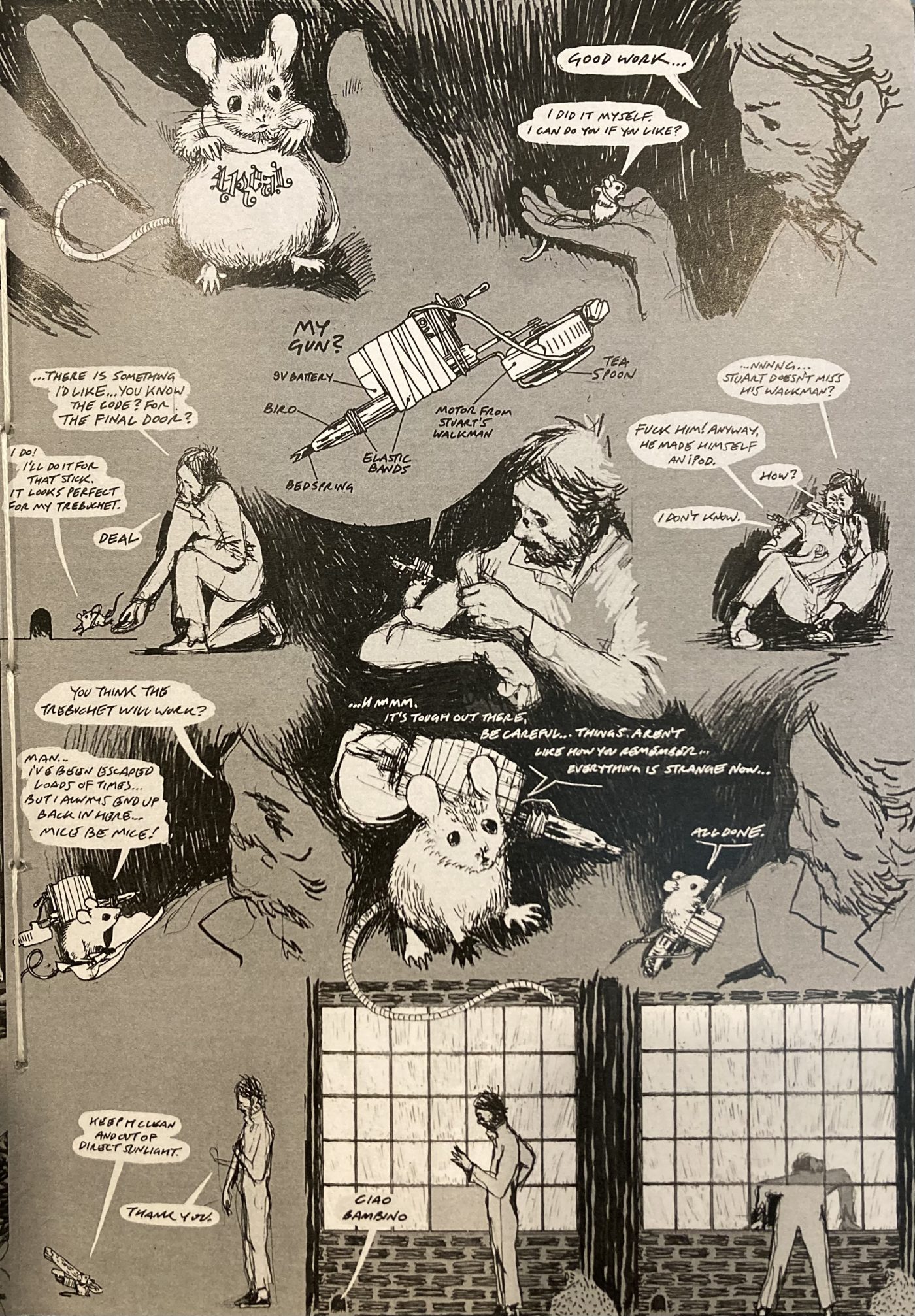
River Rangers #7 by Henry McCausland
If I won the lottery, I have a plan that I haven’t cleared with my wife yet. I would create a comics-only alt-weekly style magazine and back the Brink’s truck up to the homes of several cartoonists so they could produce new serialized work. Adam de Souza, Gizem Vural, Urbano Mata, Drew Lerman — they’d all get strips. I’d have to reserve a whole Nemo-sized page for Henry McCausland. Or I could just take the money and never see any of you again. Another anecdote: I was contacted by a comic publishing company earlier this year to try out for an editorial role. I think my work ethic and attitude did not impress so I was asked to do a second try-out session and I said, “No.” The alienation, self-imposed or not, from comics continues down the track. But I refuse to turn my back because I have more to give and more I owe to the medium. I still feel, also, like I have more to prove to myself, my grandfather, my sons, and the writers who I read fervently and I feel like I will never catch up to like Tucker Stone, David Brothers, and Matt Seneca (two of which have sent me comics to review for this column, but I’m too intimidated to do so). I’m stuck here. I’m not going anywhere.
We find ourselves in a prison and nightfall has settled in. A man in solitary confinement notices a cavalcade of sticks floating toward his barred window and launches an ad-hoc grappling hook made from string and pieces of bedframe. The series thus far has been whimsical with hints of hardcore violence, but here McCausland dips his toes into the prison break heist genre. Naturally, it’s all stick-based hijinks and contraptions that would make Rube Goldberg blush. Using the bundle to construct everything from a ladder to a shiv, from a firestarter to a nudie magazine, the inmate, in a long series of enterprising decisions and innovative cartooning — it really doesn’t get better than this — over 28 pages, makes it up to top of the building then down to the ground level. McCausland can’t help but include a smidgen of absurdism with a hard-plight mouse that aids in the jailbreak. In spite of that and his past memories slithering up on him, the man tosses his sticks into the murk and departs through the trees. Dig your holes up to the sky.
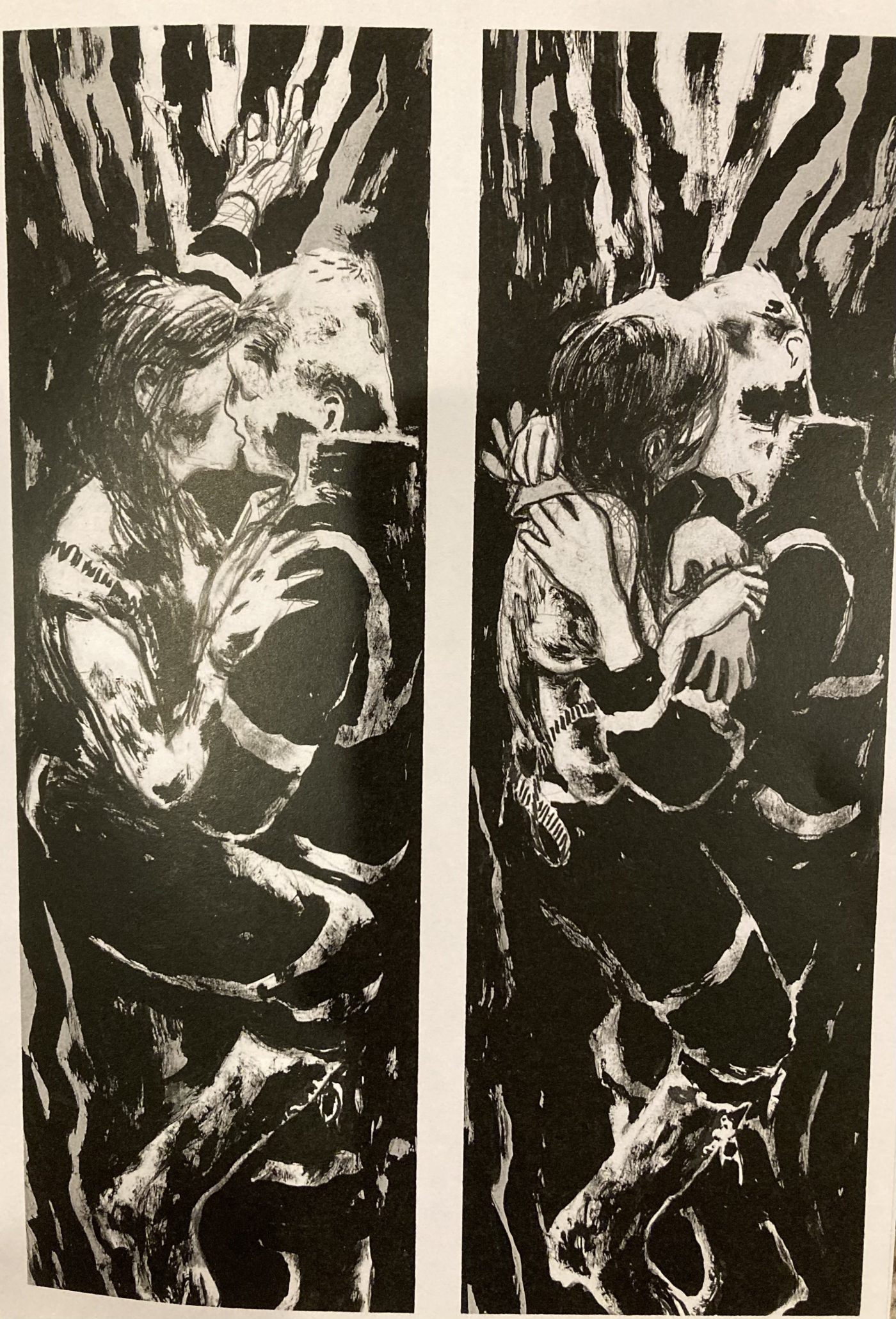
River Rangers #8 by Henry McCausland
As much as I feel disconnected from comics, I have no desire to stop writing. Not when there are things like River Rangers being created. It’s unusual that a cartoonist is perfecting such an unorthodox style while also keeping it wildly entertaining. In this most recent issue from 2025, McCausland introduces paneled pages for the first time, inducing a unique dopamine hit. We encounter a group of miners and are privy to their gossip and portmanteaus in the first half. Then two go missing, falling down a tight crevice. The panels then become vertically elongated with dark, splotchy abstraction. At this moment, McCausland’s River Rangers had me dangling from its majestic maw like a kitten. Time passes and we’re introduced — through people panicking about sticks — to the trapped miners again. They had kids. Those kids all have autonomy and confidence and on that final page of issue #8, everyone is full of love. So much so that it makes a reader (at least this reader) feel at ease enough, brave enough, to reflect on and reassess their entire journey on this planet. If books like this keep getting made — inscrutable minor miracles, each and every issue — then I’m sure there’s still a place in comics for me.
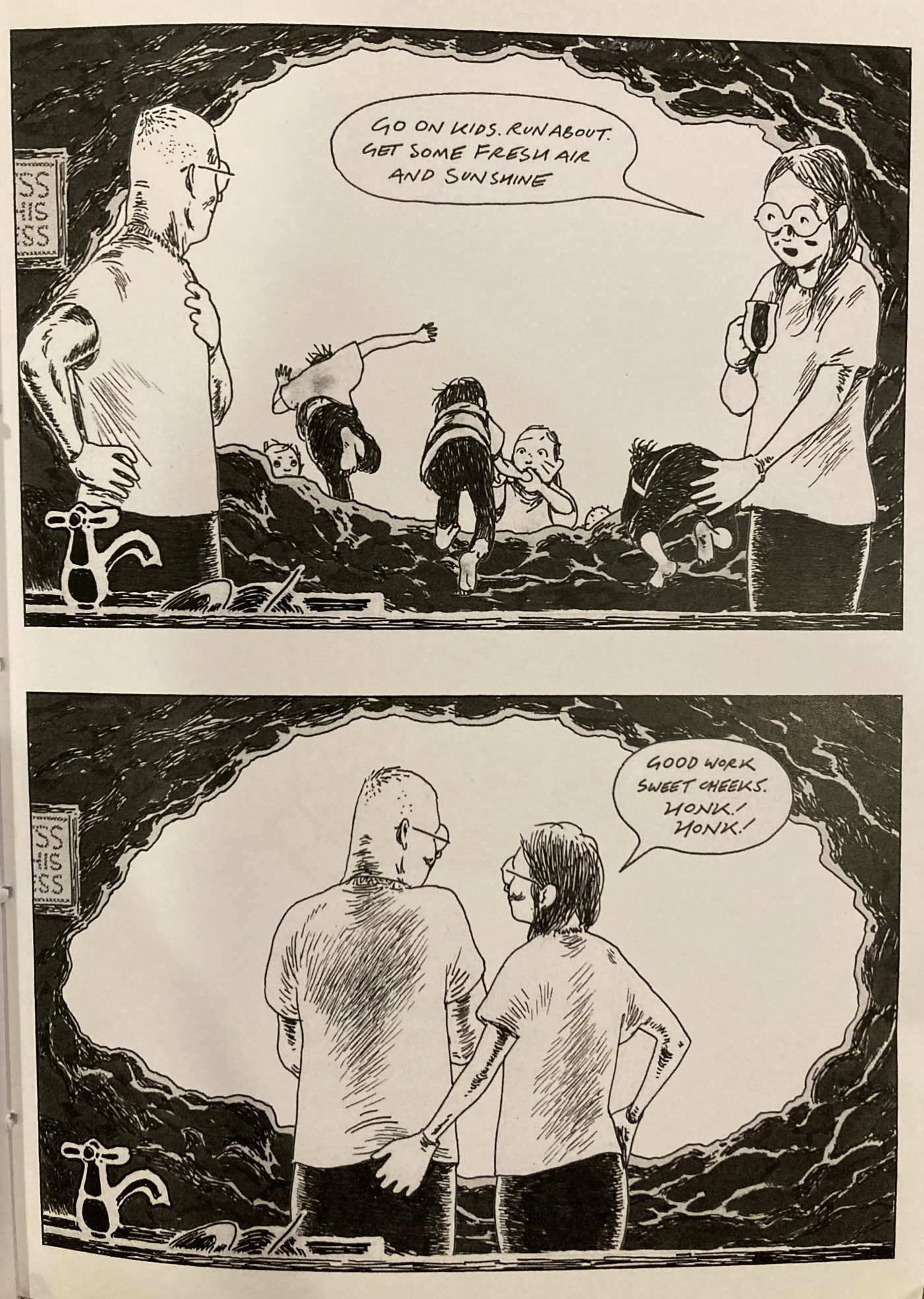
A few months ago I joked on social media that I’ll eat my hat if there’s a better ongoing comic series than this. Someone messaged me and asked what it’s about. Well, it’s about a bunch of unnamed weirdos handling driftwood. It’s also about Henry McCausland’s ability to create something so sublime it brings a tear to my eye. He has made it through eight of the promised twelve issues, but I hope it never ends. This is what comics can be. What a life. What a series. Lovely, lovely, lovely.
OK, that’s enough vulnerability. I’ll never tell the truth again. See you next month, I hope.
Questions, love letters, and submissions to this column can be directed to @rjcaseywrites on Instagram.
The post Arrivals and Departures — July 2025 appeared first on The Comics Journal.

No comments:
Post a Comment